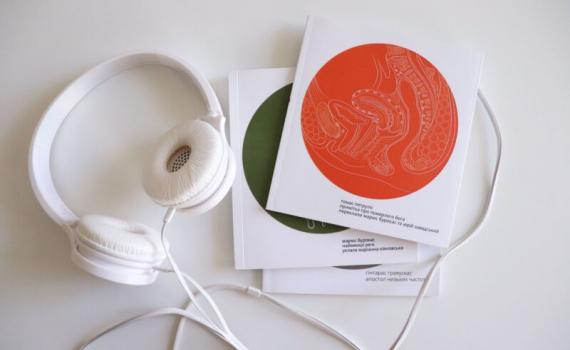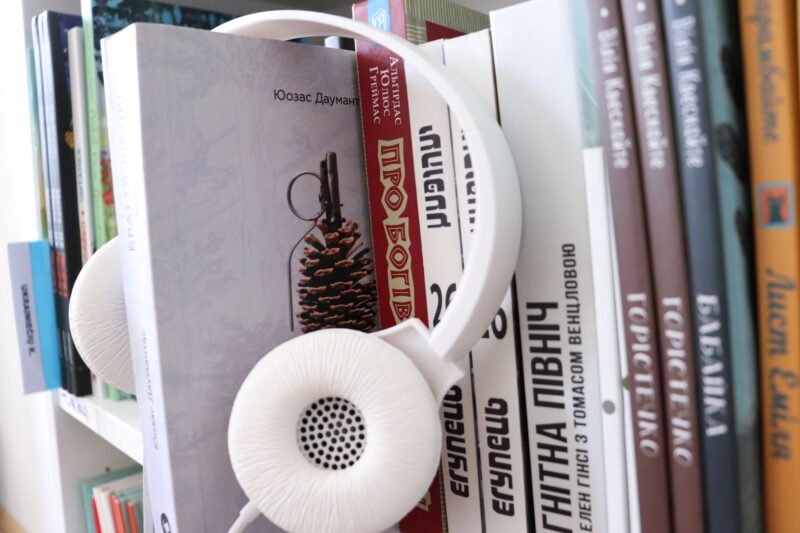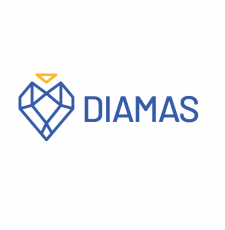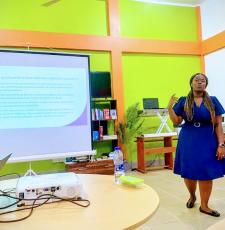
Teresa Hackett, EIFL Copyright and Libraries Programme Manager, highlights an information sheet developed by EIFL for EU libraries supporting Ukrainian refugees with print disabilities. We developed the resource in response to requests from libraries seeking information on getting accessible books in Ukrainian to support the new arrivals.
Since the start of the Russian invasion of Ukraine in February 2022, many of the seven million people forced to relocate for their safety have entered the European Union, where they have been granted temporary protection. The majority are women and children. For the new school year, teachers all over Europe are working to integrate Ukrainian children into local schools with language, learning and curriculum support.
Those who are blind and visually impaired face additional obstacles, and the availability of reading material in accessible formats, such as Braille and digital audio, in the Ukrainian language plays a vital role in supporting education and integration. Libraries in the EU are seeking to quickly source accessible books and other reading materials to cater for this emergency need. What are the legal issues that need to be considered in serving the new arrivals? An information sheet from EIFL, available in English and Ukrainian, seeks to uncover the answers.
The copyright questions
What is the copyright situation regarding the making and sharing of accessible format copies by libraries in Ukraine and in the EU? Can accessible books be sent from Ukraine to an EU country? Can a library in an EU country share the accessible copies with a library in another EU member state?
The Marrakesh Treaty for persons with print disabilities provides an excellent international legal framework that allows the making and distribution of accessible format copies for people with print disabilities, and the sharing of accessible books across national borders. The European Union implemented the Marrakesh Treaty in 2018. However, since Ukraine has not yet joined Marrakesh, the treaty in this case provides only a partial solution, and additional steps are needed to assess the copyright situation. [Update: Ukraine joined the Marrakesh Treaty in 2023, and the treaty entered into force with respect to Ukraine on 8th September 2023].
The copyright framework: Ukraine and the EU
First of all, does Ukrainian copyright law allow the making and the export of accessible format books? The good news is that Ukraine’s Copyright Act, amended in 2017, allows the making of accessible format copies for non-commercial purposes. It also appears to allow the sending (export) of the accessible format copy to another country, such as an EU member state, for example, by a library or disability organization. [Update: Ukraine amended its copyright law in March 2023 to implement the Marrakesh Treaty].
Second, does the EU country as a general rule allow the import of a copyright-protected work from a non-EU country, such as Ukraine? The answer depends on the copyright law in each EU country.
If the copyright law permits import, a library or other authorized entity can legally receive the accessible copy from Ukraine. It can then do with that copy whatever national law allows. At this point, the EU Marrakesh Treaty framework would kick in. EU implementation of the Marrakesh Treaty is regulated in two ways: a Directive that allows for the creation and circulation of accessible format copies within the EU, and a Regulation on cross-border exchange of accessible format copies from EU member states to non-EU countries that have joined the Marrakesh Treaty.
If the copyright law does not allow import, the library cannot obtain accessible books directly from Ukraine. However, under the EU Marrakesh framework, it can receive lawfully acquired accessible copies from libraries in other EU member states. In other words, the library can get books that originate in Ukraine via a library in another EU country that allows such books to be imported.
Example: EU member state - Lithuania
Taking Lithuania as an example, the Lithuanian copyright act appears to allow the import of single works not intended for general distribution.
And in 2018, Lithuania amended its copyright act to implement the Marrakesh Treaty, as per EU legislation. In accordance with the EU Marrakesh Directive, Article 25(2) of the Lithuanian copyright law permits a library or other authorized entity to share a lawfully acquired accessible copy with libraries in all 27 EU member states, as well as directly with print disabled persons in these countries.
In accordance with the EU Marrakesh Regulation, Article 25(6) allows accessible copies to be sent to non-EU countries that have joined the treaty. Thus a library or other authorized entity in Lithuania could forward copies of an accessible format copy it received from Ukraine to authorized entities and Ukrainians with print disabilities in Marrakesh Treaty countries throughout the world.
How the Lithuanian Library for the Blind is supporting Ukrainian refugees
Lithuania is currently home to over 65,000 people who have left Ukraine since the start of the war. The Lithuanian Library for the Blind (LAB) realized that some of the people arriving would have special reading needs, but the library didn’t have Braille or audiobooks in Ukrainian. Library staff quickly mobilized to obtain books in Ukrainian, in cooperation with the Ukrainian Union of the Disabled (USI). Currently LAB has received about 200 audio books and 100 Braille books for children and teenagers in print and electronic braille format. The books are available to beneficiaries through the online library, known as ELVIS (https://elvislab.lt/).
Importantly, librarians at LAB created catalogue records for the new books with metadata and standardized bibliographic descriptors to enable the integration of the titles into other online library catalogues, thereby enhancing discoverability. Libraries in other Marrakesh Treaty countries, including the EU, can find and request the resources to support Ukrainians with print disabilities who are living locally.
LAB is also providing access to accessible audiobooks by Lithuanian authors that are translated for the first time into Ukrainian. The production of audio ands Braille books by Lithuanian authors was initiated and supported by the Lithuanian Culture Institute.
For more information, contact Inga Davidoniene, Director, Lithuanian Library for the Blind E-mail: i.davidoniene [@] labiblioteka.lt
Marrakesh - a humanitarian treaty
The Marrakesh Treaty was adopted by WIPO member states in 2013. According to WIPO, the treaty has “a clear humanitarian and social development dimension" and its main goal is to create a set of mandatory limitations and exceptions for the benefit of the blind, visually impaired, and otherwise print disabled (VIPs)”.
EU implementation of the Marrakesh Treaty, just a few short years ago in 2018, smooths the way for people with print disabilities in every EU member state to obtain the books and reading material they need. And libraries across the bloc can now pool their accessible resources to serve people with particular subject interests or language needs.
Now the treaty has a major role in helping EU libraries to support Ukrainian refugees with print disabilities. Libraries can start to create collections in Ukrainian to enable children and teenagers to continue their education, and to support adults reading in their mother tongue. Importantly, they can share the resources with libraries in the EU and other Marrakesh Treaty countries around the world.
To remove the legal impediments for Ukranians with print disabilities everywhere, we hope that Ukraine can also in due course join the Marrakesh Treaty. [Update: Ukraine joined and implemented the Marrakesh Treaty in 2023].
Further information
- EIFL information sheet - Supporting Ukrainian Refugees with Print Disabilities (in English and in Ukrainian)
- More about the Marrakesh Treaty
- Up-to-date list of countries that have joined the Marrakesh Treaty
- For information on national implementations of the Marrakesh Treaty, see ARL compilation of legal provisions that implement the treaty’s requirements in Marrakesh Treaty countries
- For information on specific library rights as implemented under the treaty in each country, see IFLA Marrakesh Monitoring Report (January 2022)
SHARE / PRINT








